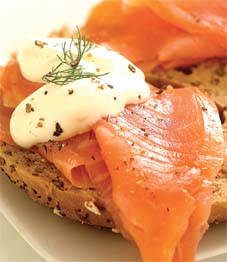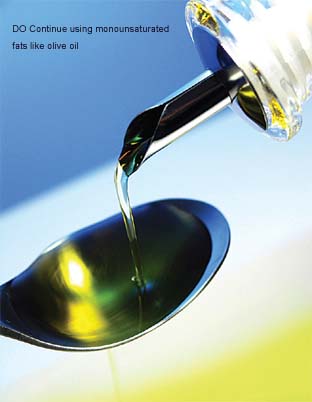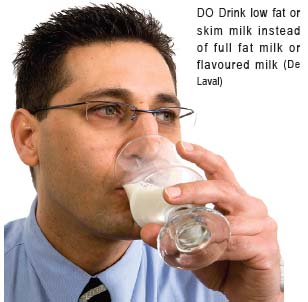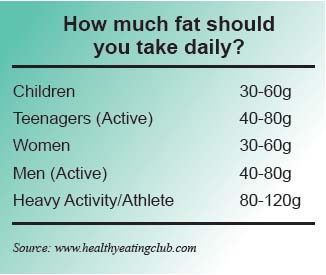
FOR many years the finger was pointed at fat for increasing the risk of obesity, heart disease, cancer and other diseases. Eating too much of certain types of fat can be harmful; however, some fats are essential for normal body function and good health. So, why do we need dietary fat? Fat is needed in the diet as an energy source. Gram for gram it provides more than twice as many calories as carbohydrates and proteins (fat provides 9 calories per gram whilst carbohydrates, including sugars, and proteins provide 4 calories per gram). Most of the fat in the body is stored as adipose tissue, which store energy, insulate the body and cushion organs. Essential fatty acids such as linoleic and linolenic acids, which are supplied by dietary fat, are is needed for the regulation of cholesterol metabolism, prostaglandin production and for the supply and/ or absorption of fat soluble vitamins (vitamins A, D, E and carotenoids) Facts on fats and health Many recommendations from nutritionists and medical experts since the 1980s called for low fat diets. High fat diets were thought to contribute to obesity, heart disease and cancer. Many scientists now question these simple messages about fat reduction, however, especially given emerging research that the type of fat may be at least as important as the amount of fat. One of the biggest changes in recent years is the report from the World Cancer Research Fund (WCRF), which, in contrast to previous reports, did not specifically include a recommendation on fat reduction.

Cancer. WCRF and the American Institute for Cancer Research report on "Food, Nutrition, Physical Activity and the Prevention of Cancer" (2007) reviewed all of the science on dietary fats and oils and cancer risk. The report concluded that "... there is only limited evidence suggesting that diets relatively high in fats and oils (in total or any type) are in themselves a cause of cancer. This judgment contrasts with those of earlier reports which concluded from evidence then available that diets high in fats and oils might be a substantial cause of some cancers."


Overweight and obesity. Body weight is determined by a complex interaction between genetic, metabolic, behavioural, environmental and cultural influences. In terms of dietary intakes, an increase in body weight occurs when we take in more calories than we expend. Fats, providing twice the calories of proteins or carbohydrates, may lead to weight gain if the excess calories are not balanced by physical activity. However an excess intake of calories from any source can lead to weight gain. Heart disease. Excess intakes of saturated (animal fats such as butter, the fat on meat) and trans fatty acids can increase blood cholesterol, a risk factor in the development of coronary heart disease. Trans fats can also lower levels of "good cholesterol" or high-density lipoprotein (HDL) cholesterol. Recommendations to reduce the risk of heart disease are to replace saturated fats with monounsaturated and polyunsaturated fats and to keep the intake of trans fatty acids as low as possible. A healthy body weight is also important in preventing cardiovascular disease. In the past, low fat diets were the standard recommendation to prevent heart disease; however, new research suggests that higher fat diets with better palatability may provide better heart health benefits provided the right type of fat is eaten. A study comparing low fat (12% total fat) weight loss diets to those with a level of 35% monounsaturated fat but with equivalent calories reported that the diet high in monounsaturated fats lowered levels of "bad cholesterol" or low-density lipoprotein (LDL) cholesterol and oxidative susceptibility, thereby lowering the risk of cAir Force 1 Foamposite

 iConnectHub
iConnectHub
 Login/Register
Login/Register Supplier Login
Supplier Login



























